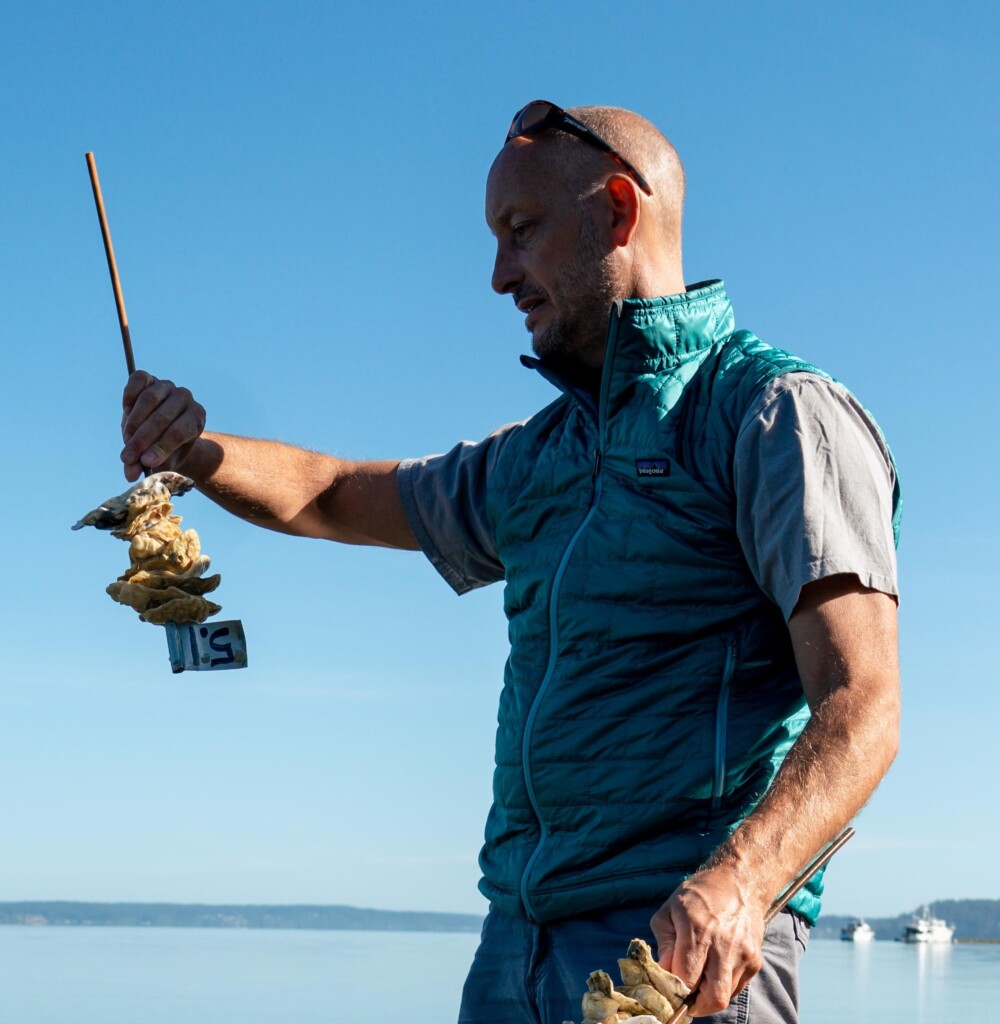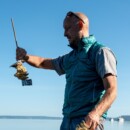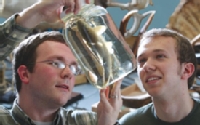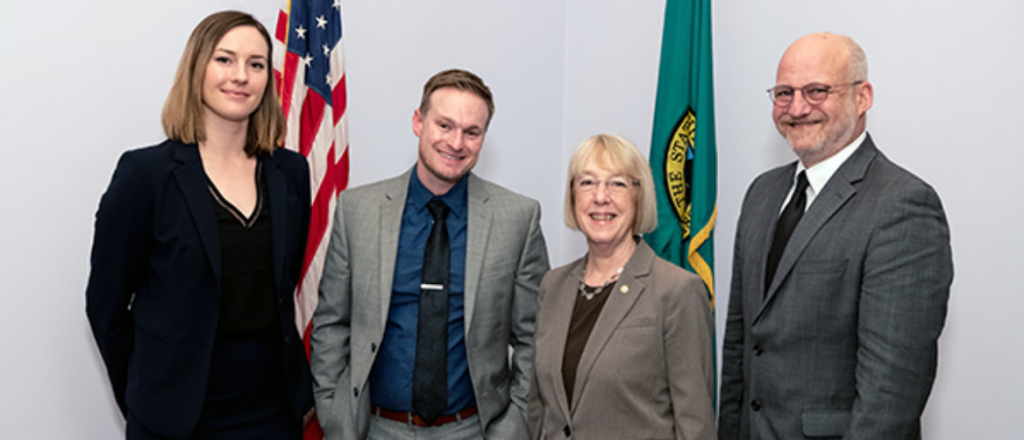Page 3 • (330 results in 0.023 seconds)
-
Environmental Health and Safety safety@plu.edu
accessed within each department during staff work hours. For quick reference and convenience only, online SDS links are provided in the right sidebar of this page to enable students and staff to access information about any hazardous chemical. It is not intended as the primary or secondary SDS resource, but simply an additional reference.Washington Department of Ecology: Dangerous Waste Regulations https://ecology.wa.gov/Regulations-Permits/Guidance-technical-assistance/Dangerous-waste-guidance/Common
-
Students are encouraged to do research with a faculty member during their undergraduate experience at PLU.
biotechnological significance. As part of our microbiology course, PLU students and I examine microbial communities in various soils collected from the Pacific Northwest. Because only 1% or less of Earth’s bacteria has been successfully cultured in the laboratory, we compare culture-dependent and culture-independent techniques, including many molecular tools, to assess the diversity of various environmental niches. Mike Behrens My research interests include ecology and biogeography, primarily in aquatic
-
Bella Bravo & Miranda Morgan Jen Soriano Cascadia Field Guide: Art, Ecology, Poetry
Past Visiting Writers2023-2024Bella Bravo & Miranda Morgan Jen Soriano Cascadia Field Guide: Art, Ecology, Poetry2022-2023Leila Renee & Erin Strubbe Victoria Chang Sasha taqʷšəblu LaPointe2021-2022John Englehardt Aram Mrjoain Jane Wong 2020-2021Antonio Ruiz-Camacho Sejal Shah2019-2020Anders Carlson-Wee Nathan Vass Caitlin Hamilton Summie (Cancelled) Charles Bergman2018-2019Katie Ford Melissa Michal Elissa Washuta2017-2018Rajesh Parameswaran Jennifer Sinor Minal Hajratwala Kaveh Akbar 2016
-
Greg Williams is a Professor in the Department of Education whose research has focused on the development and implementation of effective classroom and behavioral management procedures for children
Gregory J. Williams, PhDSchool of Education and KinesiologyEnriching Field Experiences with Virtual Communication Dr. Gregory J. Williams (PLU Photo/Katie Martell) Greg Williams is a Professor in the Department of Education whose research has focused on the development and implementation of effective classroom and behavioral management procedures for children and youth with emotional/behavioral disorders. In his work with students who attend PLU’s teacher training programs, Greg understands the
-

Professor of Biology | Department of Biology | behrenmd@plu.edu | 253-535-7565 | My teaching activities focus primarily on ecology and animal diversity.
Michael Behrens Professor of Biology he/him/his Phone: 253-535-7565 Email: behrenmd@plu.edu Office Location: Rieke Science Center - 145 Office Hours: (On Campus) Mon: 11:30 am - 1:00 pm (On Campus) Wed: 10:00 am - 11:00 am (On Campus) Thu: 10:00 am - 11:00 am (On Campus) Fri: 2:00 pm - 3:00 pm (On Campus) Mon - Fri: By Appointment Curriculum Vitae: View my CV Professional Biography Personal Video Additional Titles/Roles Director of Environmental Studies Education Ph.D., Ecology, Evolution and
Office HoursMon: 11:30 am - 1:00 pmWed: 10:00 am - 11:00 amThu: 10:00 am - 11:00 amFri: 2:00 pm - 3:00 pmMon - Fri: - -

Director of Environmental Studies | Environmental Studies | behrenmd@plu.edu | 253-535-7565 | My teaching activities focus primarily on ecology and animal diversity.
Michael Behrens Director of Environmental Studies he/him/his Phone: 253-535-7565 Email: behrenmd@plu.edu Office Location: Rieke Science Center - 145 Curriculum Vitae: View my CV Professional Biography Personal Video Additional Titles/Roles Professor of Biology Education Ph.D., Ecology, Evolution and Marine Biology, University of California, Santa Barbara, 2005 M.A., Ecology, Evolution and Marine Biology, University of California, Santa Barbara, 2003 B.S., Biological Sciences: Concentration in
-

BIOL 125/126: Molecules, Cells and Organisms/ Genes, Diversity and Ecology Name: Sean Boaglio Hometown: Longview, Wash. Major: Undeclared, leaning Biology Professor: Jacob Egge, assistant professor of biology Sean’s advice to first-year students: “Study with someone. It is a great way to meet people in your…
August 5, 2010 BIOL 125/126: Molecules, Cells and Organisms/ Genes, Diversity and Ecology Name: Sean Boaglio Hometown: Longview, Wash. Major: Undeclared, leaning Biology Professor: Jacob Egge, assistant professor of biology Sean’s advice to first-year students: “Study with someone. It is a great way to meet people in your class. And when you explain something to someone else, it also helps you understand it better.” For students who want to enter PLU’s rigorous Health Sciences track, the first
-
The University of Nebraska’s summer program offers research opportunities in the science, technology, engineering, and mathematics fields in addition to an interdisciplinary Minority Health Disparities program aimed at converting cutting edge social and behavioral research into an understanding and reduction of health disparities among minorities.…
Summer Research Program – University of Nebraska Posted by: alemanem / December 1, 2016 December 1, 2016 The University of Nebraska’s summer program offers research opportunities in the science, technology, engineering, and mathematics fields in addition to an interdisciplinary Minority Health Disparities program aimed at converting cutting edge social and behavioral research into an understanding and reduction of health disparities among minorities. Summer 2017 research programs include
-
PLU’s Alumni & Student Connections notified us about several entry level positions at Fred Hutch. Research Technician 1 Research Technician 1, Brain Metastasis Project Coordinator 1, Digital Behavioral Health Clinical Research Coordinator 1 Lab Aide At Fred Hutchinson Cancer Research Center, home to three Nobel…
Entry Level Job Opportunities at Fred Hutch Posted by: nicolacs / August 5, 2020 August 5, 2020 PLU’s Alumni & Student Connections notified us about several entry level positions at Fred Hutch. Research Technician 1 Research Technician 1, Brain Metastasis Project Coordinator 1, Digital Behavioral Health Clinical Research Coordinator 1 Lab Aide At Fred Hutchinson Cancer Research Center, home to three Nobel laureates, interdisciplinary teams of world-renowned scientists seek new and innovative
-

TACOMA, WASH. (May 24, 2019) — A PLU psychology professor is doing his part to secure funding for federal agencies and programs that support social and behavioral science research. Dr. Corey Cook met with Washington Senator Patty Murray and other members of Congress on Capitol…
Pacific Lutheran University Psychology Professor Meets with Members of Congress Posted by: Marcom Web Team / May 24, 2019 Image: Image: Dr. Corey Cook (center) meets with Senator Patty Murray on Capitol Hill during COSSA’s Advocacy Day May 24, 2019 By Pacific Lutheran UniversityTACOMA, WASH. (May 24, 2019) — A PLU psychology professor is doing his part to secure funding for federal agencies and programs that support social and behavioral science research. Dr. Corey Cook met with Washington
Do you have any feedback for us? If so, feel free to use our Feedback Form.


